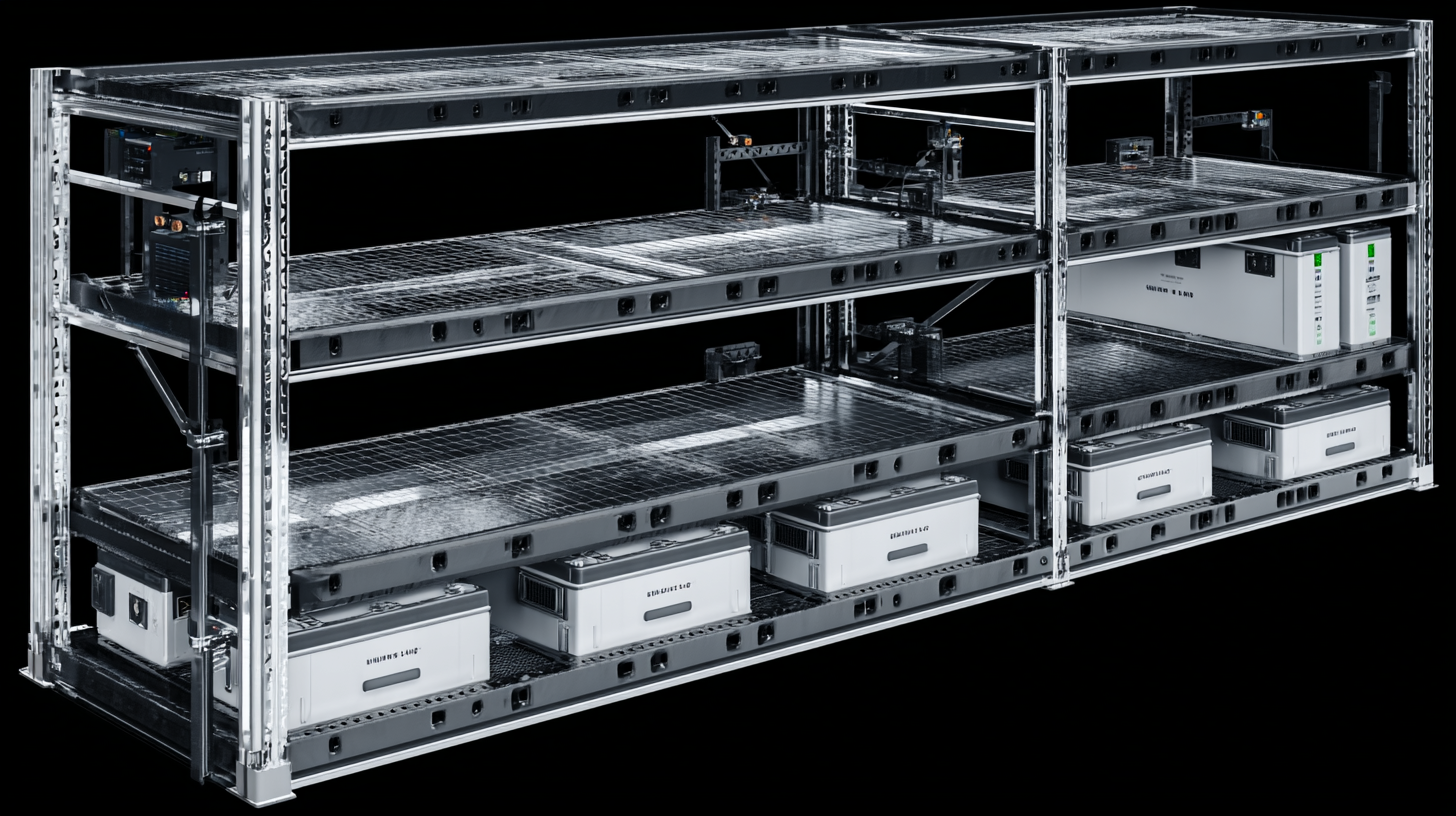Your Ultimate Guide to Selecting Battery Racks for Optimal Performance and Safety in Energy Storage Systems
Table of Contents
- Benefits of Choosing the Right Battery Racks for Energy Storage Efficiency
- Enhancing Safety Standards Through Quality Battery Rack Design
- Maximizing Space Utilization with Innovative Battery Rack Solutions
- Improving Battery Lifecycle and Performance with Proper Racking
- Cost-Effectiveness of Optimized Battery Racks in Energy Systems
- Environmental Considerations and Sustainability in Battery Rack Selection
- FAQS
- Conclusion
- Related Posts
In the rapidly evolving world of energy storage systems, selecting the right components is crucial for ensuring optimal performance and safety. Among these components, Battery Racks For Batteries play a pivotal role in organizing and supporting battery systems, particularly in applications such as household energy storage and electric bicycles. With over 27 years of industry experience, Roofer Electronics Technology (Shanwei) Co., Ltd. specializes in the research, development, and manufacturing of lithium batteries and energy storage solutions. Roofer's expertise ensures that our battery products and services are designed for efficiency and reliability across various fields, from lead-acid replacements to powering household appliances. This blog serves as your ultimate guide to selecting the best battery racks to maximize your energy storage systems' potential while prioritizing safety and performance.

Benefits of Choosing the Right Battery Racks for Energy Storage Efficiency
When it comes to energy storage systems, selecting the right battery racks is pivotal for maximizing efficiency. The design and material of battery racks can impact not only the safety of the storage solution but also its overall performance. High-quality battery racks ensure proper airflow and thermal management, which are essential for maintaining optimal operating temperatures. This, in turn, enhances the longevity of the batteries and maximizes energy efficiency by preventing overheating and performance degradation.
In addition to improving efficiency, well-chosen battery racks contribute to safety by minimizing the risk of accidents. A sturdy and reliable rack can prevent damage to the batteries during operations or maintenance. Moreover, certain racks are designed with features that facilitate better cable management, reducing the likelihood of electrical faults. By investing in the right battery racks, users can cultivate a safer environment for energy storage, ensuring that the system operates smoothly and effectively, while also safeguarding the longevity of their investment.
Your Ultimate Guide to Selecting Battery Racks for Optimal Performance and Safety in Energy Storage Systems
This chart illustrates the efficiency benefits of different battery rack materials and designs in enhancing the performance and safety of energy storage systems.
Enhancing Safety Standards Through Quality Battery Rack Design
In the rapidly evolving field of energy storage systems, enhancing safety standards through quality battery rack design is crucial. According to a recent report by the International Electrotechnical Commission (IEC), nearly 30% of battery-related incidents stem from inadequate rack designs, underscoring the need for meticulous considerations in engineering and safety specifications. Battery racks must not only support the weight and provide structural integrity but also ensure proper ventilation and thermal management to prevent overheating—a leading cause of battery failure.
Furthermore, the National Fire Protection Association (NFPA) emphasizes that the selection of appropriate materials for battery racks can significantly mitigate fire risks. Utilizing non-conductive, flame-retardant materials can reduce the probability of short circuits and subsequent fire hazards. Additionally, implementing designs that allow for easy access to batteries for inspection and maintenance enhances overall safety. Data from the Clean Energy States Alliance (CESA) indicates that facilities adopting superior rack designs have reported a 40% reduction in safety incidents, illustrating the importance of investing in high-quality battery rack systems to protect both equipment and personnel.
Your Ultimate Guide to Selecting Battery Racks for Optimal Performance and Safety in Energy Storage Systems
| Parameter | Value | Importance |
|---|---|---|
| Material Type | Steel | High durability and strength |
| Load Capacity | 2000 kg | Safety in weight distribution |
| Design Type | Modular | Ease of installation and repair |
| Ventilation | Active ventilation system | Prevents overheating |
| Corrosion Resistance | Coated with anti-corrosive paint | Ensures long-term durability |
| Standard Compliance | UL and IEC standards | Meets industry safety regulations |
| Warranty Period | 5 years | Reliability assurance |
Maximizing Space Utilization with Innovative Battery Rack Solutions
When it comes to optimizing energy storage systems, selecting the right battery racks is essential not just for performance but also for maximizing space utilization. Innovative battery rack solutions enable users to efficiently organize and handle batteries, thereby enhancing accessibility and safety. With Roofer Electronics Technology's extensive experience in lithium battery R&D and manufacturing, we provide battery racks designed to accommodate various energy storage applications while ensuring a neat and space-efficient installation.
Our battery racks are adaptable to different environments, from household energy storage to commercial use, allowing for seamless integration into existing systems. By utilizing vertical space and modular designs, Roofer's innovative solutions help you store more energy in less space, ultimately increasing the overall capacity of your energy storage system. As we continue to push the boundaries of technology, our racks not only solve space challenges but also contribute to the longevity and safety of battery systems, making them a smart choice for any energy storage needs.

Improving Battery Lifecycle and Performance with Proper Racking
When it comes to energy storage systems, the arrangement and support of batteries play a crucial role in maximizing their lifecycle and performance. Proper racking not only ensures the stability of batteries but also facilitates efficient heat dissipation, reducing the risk of thermal events. Choosing the right battery racks tailored to your specific battery type can significantly enhance their operational efficiency. Racks designed for optimal spacing help maintain the ideal temperature range, which is vital for extending the lifespan of batteries and enhancing their overall capacity.
Moreover, integrating features such as adjustable shelving and modular designs can adapt to changing energy storage needs. This flexibility allows for future expansions and upgrades without compromising safety. Quality racking systems also come equipped with safety features to prevent accidental damage or mishandling, ensuring that the batteries remain in top condition. By investing in properly designed battery racks, stakeholders can achieve a more reliable energy storage system that not only performs better but also reduces long-term operational costs.

Cost-Effectiveness of Optimized Battery Racks in Energy Systems
When it comes to energy storage systems, the cost-effectiveness of optimized battery racks plays a pivotal role in maximizing both performance and safety. According to the International Renewable Energy Agency (IRENA), battery storage costs have decreased by nearly 89% since 2010, making advanced battery racks increasingly viable for a wide range of applications. By investing in standardized and optimized battery racks, companies can not only enhance the operational efficiency of their energy storage solutions but also drastically reduce upfront and maintenance costs.
Furthermore, a report by Bloomberg New Energy Finance indicates that the global energy storage market is expected to reach over $620 billion by 2040. The selection of appropriate battery racks is crucial, as optimized designs improve space utilization and facilitate easier access for maintenance, reducing the overall total cost of ownership. Implementing effective battery rack solutions can yield a return on investment (ROI) of up to 20% by minimizing spatial inefficiencies and extending the lifespan of the batteries housed within. Ultimately, choosing the right battery rack is not just about performance; it’s also a strategic financial decision that can lead to significant savings over time.
Environmental Considerations and Sustainability in Battery Rack Selection
The selection of battery racks in energy storage systems is increasingly influenced by environmental considerations and sustainability. Recent life-cycle assessments highlight that rechargeable batteries, essential for decarbonizing energy systems, still pose significant environmental impacts during their life cycles. For instance, the environmental impact of lithium-ion battery packs, made from various materials, can vary dramatically, with studies indicating that the choice of materials can lead to a 30-50% reduction in carbon emissions when compared to conventional options. This information stresses the importance of material selection not only for performance but also for environmental sustainability.
Furthermore, in sectors such as construction, where high carbon embodiment materials have historically driven emissions, a strategic approach to material choice is essential. A systematic literature review unveiled that employing multi-criteria decision-making can effectively guide the selection of materials that are both functional and sustainable. In data centers where energy consumption is critical, optimized battery selection can minimize raw material use, thereby cutting down the overall environmental footprint.
It is crucial for industries to prioritize sustainable practices in their battery rack selection to align with global sustainability goals and reduce their ecological impact.
FAQS
: Battery rack design is crucial because inadequate designs contribute to nearly 30% of battery-related incidents, impacting safety and performance. Proper designs ensure structural integrity, ventilation, and thermal management.
The choice of materials is vital for safety; using non-conductive, flame-retardant materials can significantly reduce the risk of short circuits and fire hazards.
Quality battery rack designs facilitate easy access to batteries for inspection and maintenance, enhancing overall safety and operational efficiency.
Facilities that adopt superior battery rack designs report a 40% reduction in safety incidents, highlighting the importance of quality design in protecting equipment and personnel.
Proper racking ensures stability and efficient heat dissipation, maintaining an ideal temperature range, which is essential for extending battery lifespan and performance.
Yes, implementing features like adjustable shelving and modular designs allows for future expansions and upgrades while maintaining safety.
Investing in properly designed battery racks can lead to better performance and a reduction in long-term operational costs due to improved battery lifecycle and reduced safety incidents.
Quality battery racks facilitate efficient heat dissipation, reducing the risk of thermal events that can lead to battery failures.
Safety features in quality racking systems help prevent accidental damage or mishandling of batteries, ensuring they remain in top condition for reliable operation.
The IEC report indicates that nearly 30% of battery-related incidents arise from inadequate rack designs, stressing the need for careful engineering and safety specifications.
Conclusion
Selecting the right battery racks for batteries is crucial for optimizing performance and ensuring safety in energy storage systems. The benefits of quality battery rack design extend beyond efficiency, enhancing safety standards and maximizing space utilization. By integrating innovative solutions, users can significantly improve battery lifecycle and performance, while also being mindful of cost-effectiveness. Roofer Electronics Technology (Shanwei) Co., Ltd., with over 27 years of expertise in R&D and manufacturing, understands these critical aspects and aims to provide advanced battery rack solutions that prioritize environmental sustainability and operational efficiency. Properly selected battery racks not only contribute to safe energy storage but also support the advancement of various applications, from household energy systems to electric bicycles.
Related Posts
-

What is a Solar Cell Generator and How It Revolutionizes Energy Efficiency in Renewable Resources
-

Ultimate Guide to Choosing the Right Solar Lithium Battery for Your Energy Needs
-

How to Maximize Efficiency with Your Lithium Ion Battery Pack
-

Future Innovations in Best Solar Generating Stations for 2025 a Comprehensive Guide to Next Generation Technologies
-

Leading Global Manufacturer: Explore the Best 3.2v 100ah Lifepo4 Battery Cells Available Today
-

2025 Solar Powered Generator Trends and Comparisons to Watch for in the Industry





 business@roofer.cn
business@roofer.cn +86 13502883088
+86 13502883088






